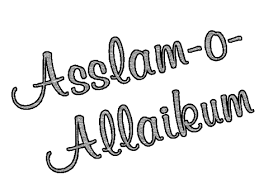"The rights of a Muslim upon another are five: returning greetings, visiting the sick, following the funeral procession, responding to invitations and offering 'Tashmeet' for one who sneezes." (Bukhari and Muslim)
The recommended greeting of a Muslim is to say:
THE VIRTUES OF SALAAM

Exchanging salaam holds a high position in Islam. Not only is salaam equated with many other important deeds, but it is one of the defining criteria of belief. We observe many Hadiths pertaining to the position of exchanging salaam in Islam.
In one Hadith a man asked the Prophet about which aspect of Islam was best. The Prophet replied:
"Feeding the hungry, and saying salaam to those you know and those you don't know." (Bukhari and Muslim)
The Prophet also said:
"You will not enter paradise until you believe, and you will not believe until you love one another: 'spread salaam' (the greeting of peace) among you." (Muslim)
The Prophet Muhammad also explained another virtue of salaam in the following Hadith:
"When two Muslims meet (give salaam), and shake hands, they are forgiven their sins before they part (with each other)." (Abu Dawud)
Finally, reflect on another saying of the Prophet , when he said:
"O people! spread salaam, feed the hungry, be in touch with your kin, and pray while people are asleep (at night) you shall enter paradise peacefully." (Tirmithi)
THE GRADES OF SALAAM

There are several forms of exchanging salaam. Each has its grade which corresponds to the extent of the phrase.
There is a Hadith where Imran Ibn Hussayn (may Allah be pleased with him) narrated that:
"A man came to the Prophet and said, 'assalaamu alaykum!' The Prophet returned his greeting and when the man sat down, the Prophet said: 'Ten.' Another man came and said: 'assalaamu alaykum wa rahmatullah.' to which the Prophet also responded, and when the man sat down, He said 'Twenty.' Another man came and said: 'assalaamu alaykum wa rahmatullahi wa barakatuh.' The Prophet returned his greeting, and after the man sat down, he said: 'Thirty." (Abu Dawud and Tirmithi)
The Hadith has been interpreted to mean that the minimum form of the Islamic greeting which is acceptable is "assalaamu alaykum" and one is rewarded ten good deeds for saying it. The second grade, adding "wa rahmatullah", raises the reward to twenty good deeds. The best grade of salaam is "assalaamu alaykum wa rahmatullahi wa barakatahu", and this is worth thirty good deeds.
The response to the greeting is similar in form and rewards. The least one could say is "Wa alaykum-us-salaam" and the best response is: "Wa alaykum-us-salaam wa rahmatulahi wa barakatahu".
In the time of the Prophet the Sahabah (companions of the Prophet ) would compete with each other, to see who could give salaams first.
The Prophet said:
"The best of the two persons is the one who begins with salaam." (Related by Nawawi in his book Al-Adkar)
"The Prophet was asked: 'O Messenger of Allah ! When two persons meet with each other, who should take the lead in greeting the other? He answered: 'The one who is closest to Allah." (Tirmithi)
The Prophet said:
"The person closest to Allah is the one who precedes others in greeting." (Abu Dawud)
 THE ISLAMIC RULING ON SALAAM
THE ISLAMIC RULING ON SALAAMInitiating salaams is considered 'Sunnah' or optional, returning the salaams after it is offered is considered 'wagib' or obligatory, based on the first Qur'anic ayah mentioned. Islam also encourages people to offer the first greeting as mentioned in the Hadiths mentioned previously.
The Prophet was asked about the most appropriate way to give salaams as shown in the following Hadith:
Anas (may Allah be pleased with him) says that a man asked the Prophet :
"O Messenger of Allah , when any one of us meets a Muslim brother or a friend then should he bow his head (as a sign of courtesy to him)?' He said: 'No.' The man said: 'Should he embrace him?' He said: 'No.' The man then asked: 'Should he clasp his hands?' He said: 'Yes." (Tirmithi)
Unfortunately, now in our community Muslims have adopted other methods of giving salutations, and as we can see in this Hadith, The Prophet was very precise about how salaams were to be given.
We as Muslims, should remember that Prophet Muhammad is the best example for us to follow in all aspects of our life, and we should be careful not to add anything new to the Deen of Islam, for fear of implying that the Prophet Muhammad did not complete his mission.
As Allah (Most Exalted is He) says in the Qur'an:
"I have not left anything which Allah (Most Exalted is He) ordered except that I have ordered you with it, nor anything that Allah forbade you, except that I forbade you from it." (Buhaiqi)
CONDITIONS UNDER WHICH SALAAM IS DISCOURAGED
There are certain situations under which it is preferable not to offer salaam. These include; when a person is relieving himself, when one is having marital relationship, when someone is sleeping or when in the bathroom.
Offering salaam when someone is reciting the Qur'an is permissible but discouraged. The same rule applies to someone who is making du'a (supplication) or one who is praying.
EXCHANGING SALAAM WITH NON-MUSLIMS
The Prophet said:
"Do not greet the Jews and the Christians with salaam." However, if they salaam first, we may reply by saying "wa alaykum" (and upon you)." (Bukhari and Muslim)
Salutation and Meeting Non-Muslims
Amr bin Shu'aib - Tirmithi: The Messenger of Allah said: "He does not belong to us who imitates people other than us. Do not imitate the Jews or the Christians, for the Jews salutation is to make a gesture with the fingers and the Christians salutation is to make a gesture with the palms of the hands."
Ayesha - Bukhari: When some Jews came to the Messenger of Allah and said, "Assaamu 'alaikom" (Death be upon you) and he replied, "Wa 'alaikom" (and upon you), she ('A'isha) said, "Death be upon you and may Allah curse you and be angry with you." The Messenger of Allah then said, "Gently, 'A'isha, keep to kindness and avoid harshness and coarseness." She asked if she had not heard what they said, and he asked if she had not heard what he said, saying, "I replied to them, and my prayer regarding them will be answered, but theirs regarding me will not." In a version of Muslim he said, "Do not be one who uses bad languages for Allah does not like bad language or the use of it."
Surah Mujadila:8: "And when they (Non-Muslims) come to thee, they salute thee, not as Allah salutes thee (but in crooked ways)." E.g. Assaamu 'alaikom.
Abu Hurairah - Muslim: The Messenger of Allah said, "Do not salute the Jews and Christians before they salute you, and when you meet one of them on the road force him to go to the narrowest part."
Ossama bin Zaid - Bukhari and Muslim: The Messenger of Allah , passed by a company of Muslims, Mushriks and Jews and he gave them a salutation.
CONTEMPORARY SALUTATIONS OF THE NON-MUSLIMS
During the Messenger of Allah's time there were various kinds of contemporary salutations in vogue, but none of these were chosen by Allah (Most Exalted is He), for the Muslims. The superiority of the Muslims Salaam has already been mentioned previously. It was deemed apt that a paper on salutations should also include an analysis of the modern Non-Muslim salutations. In this section the etymological meaning of some of these salutations will be traced back. By doing so it is hoped that the Muslim will further realise the importance of Salaam and abandon the use of Non-Muslim salutations. The Concise Oxford Dictionary has been used so that others can easily refer to it.
"Hello"
The Oxford Dictionary has the following entries on this word:
- Hello: "Expressing surprise or informal greeting or beginning telephone conversation.(The) cry 'hello'. (Variety of Hallo.)";
- Hallo, halloa': "Calling attention or expressing surprise or informal greeting or beginning telephone conversation...(The) cry 'Hello'. (Variety of earlier Hollo.)";
- Halloo: "Inciting dogs to the chase, calling attention, or expressing surprise...The cry 'halloo'.;
- Halloo: "Cry 'halloo!' especially to dogs; urge on (dogs etc.) with shouts; shout to attract attention.";
- Holler: "(Make, express with) loud cry or noise. (Variety of Hollo.)";
- Hollo, holla: "Calling attention...cry of 'Hollo'.";
- Hollo, ho'llow "Shout; call to (hounds)."
Good Morning
There is no etymological entry on this word in the Concise Oxford Dictionary, but it is defined under the word good as: "(Used in forms of greeting or parting, as) good...morning, night..." In the Compact Edition of the Oxford English Dictionary we have the following entries: Good morrow, good mo'rrow. "A salutation used at meeting in the morning, equivalent to the later good morning...(God) give you good morrow...(e.g.) good morrowe to thee!; ...an idle, trivial or empty saying..."
There is no reason why a Muslim should substitute his Salaam for any other rather meaningless Non-Muslim salutation. In fact, not all mornings are necessarily good. Good morning...so what? The salutation of Salaam is not meaningless. The person saying Salaam is invoking Peace, Mercy and Allah's Blessing on the one being greeted. The equivalent of good morning in modern Arabic is "Subh Khair". It should not be used.
Goodbye
This is defined as "(Saying of) farewell (expressing good wishes on parting, ending telephone conversations etc., or figurative with reference to thing got rid of or irrevocably lost.) (Contraction of God be with you!...)
The modern expression goodbye has no meaning and it cannot be compared with Salaam. Salaam is not just a mere expression of good wishes; it is du'a. The word goodbye also implies that the person using it is rather happy to get rid of the person being saluted. This kind of feeling or expression has no place in the Islamic concept of Brotherhood. The word goodbye was originally the expression, "God be with you", and the fact that it has been changed is further evidence that the Christians have tampered with their original teachings. Now-a-days, the word goodbye has been further reduced to just bye. So they first lost the God and now even the good for their farewell.
In Islam the salutation of Salaam is used on all occasions, on meeting and for farewell. There are also other additional farewell dua's which can be used with Salaam. Examples are: "Fee Iman Allah" (May Allah keep you safe) and "Astowda Okomallah" (May Allah guard you). The term "Khuda hafiz" (God keep you safe) is used in Persian and Urdu. It will be noted that the original meaning of goodbye is very similar to these dua's.
The Conveyance of Regards
The word regards means the "Expression of friendliness in letters etc., compliments". It is used to convey expressions of friendliness from one person to another, for example, so and so sends his regards to you. This word implies the conveyance of mere expressions and it is also related with friendliness. Muslims are Brothers in Islam and not just friends. According to a Hadith the Muslims should use Salaam to convey salutations to fellow Muslims. The term regards is not suitable for use amongst Muslims.
Special Modes of Salutation

There are certain special modes of greeting used by the Non-Muslims. Amongst these is the practice of lowering oneself or bowing down in front of another human being when greeting. This is based on their belief of the inequity of human status, that the one bowing down is inferior to the one being greeted. It has nothing to do with respect. This method of greeting is un-Islamic. Firstly, bowing down in front of anybody except Allah is forbidden in Islam. Secondly, all believing human beings are equal in Islam and thus there is to be no special greeting for the so called great men of authority and position. The great in Islam are those who are nearer to Allah in piety. S. Abdul Hai (1977) writes " Islam has prescribed a simple mode of salutation for all, great and small. During the earliest times of Muslim rule, even a commoner saluted the Caliphs simply by saying, "Assalaamu 'alaykum ya Amir ul Momineen" (Peace be upon you, O Commander of the Faithful)." We should be proud of our Islamic heritage.
GREETING THE YOUNG
It is considered a part of the Sunnah for adults to offer salaam to children in order to teach them the proper greeting manners and to build their self esteem. In both Al-Bukhari and Muslim, Anas (may Allah be pleased with him) narrated that the Prophet passed by some youth and he offered salaam to them. Anas (may Allah be pleased with him) also reported that the Prophet , used to do this quite often.
ETIQUETTE OF SALAAM
There are several etiquette's to be followed with respect to the exchanging of salaam. The Prophet (saws), for example said:
"The person who is riding should offer salaam to the one who is walking; and the one who is walking should greet the one who is sitting; and the smaller group should greet the larger one." (Bukhari and Muslim)
Aside from the situations mentioned in the Hadith, the one who enters a house should initiate salaam to those already there. Furthermore, if one enters his home, it is preferable to offer salaam, even if there is no one at home by saying "Assalaamu alayna wa ala ibadillahi assaliheen" (i.e. peace be upon us and the righteous servants of Allah). With respect to salaam between the young and the old, the young is expected to begin the greeting.
It is also considered improper for someone to meet a group of Muslims and offer salaam only to some of them. The greeting must be for all in the group. If a group of people offer salaam to an individual at the same time, he may reply only once to all of them.
The head should never be bent as a sign of greeting. We bend our heads only to Allah. It must also be emphasized that other body gestures in any form or shape (for example, raising eyebrows, extending the arms, smiling, winking, etc.), cannot replace uttering the words of salaam.
Salaam for someone at a distance can be offered by saying the salaam and waving the hand. Waving the hand alone, however, is not considered a salaam.
Salaam is not only confined to the time of meeting only but it extends to when separating as well.
Abu Hurairah (may Allah be pleased with him), relates that the Prophet said:
"When one of you joins a gathering, he should greet those present; and when he leaves them he should salute them, because the first salutation is not better than the last one." (Abu Dawud and Tirmithi)
SAYINGS OF THE SAHABAH REGARDING SALAAM
Umar bin Khattab: "There are three ways of showing sincere brotherly love: give him the greeting of Salaam when you first meet him, make him comfortable, and call him by his favourite names."
Sa'id bin al-As: "I owe my sitting-companion three things: on his approach I greet him, on his arrival I make him welcome, and when he sits I make him comfortable."
CONCLUSION
There are two fundamental categories of human beings: Muslims and Non-Muslims. Any human being who chooses to submit to his Creator is called a Muslim and his way of life is Islam. A Muslim is a precious being in the sight of Allah. The Muslim gains special privileges, honour and dignity because of Islam. They are people (Muslims) who have achieved peace (Salaam) by accepting Peace (Islam). The salutation of Salaam is a special blessing of Allah for the Muslims. The first conclusion is that the Muslims should use Salaam to salute fellow Muslims because it is only befitting for them to do so.
It is below the dignity of the Muslim to use such expressions below their noble status. The Muslim should not degrade himself, by using Non-Muslim salutations; or his fellow Muslims, by saluting them with Non-Muslim salutation; and nor his Deen al-Islam, by adopting the ways of the Non-Muslims. The second conclusion is that Muslims should not use Non-Muslim salutations amongst themselves because these are unfit for them. The Muslims should not only refrain from using Non-Muslim salutations, but they should abhor such practices.
The Non-Muslim human being, a Kafir, is one who chooses to reject the message of Peace and adopt his own anti-Islamic way of life, Kufr. Such beings are in utter discord, and their life is in contradiction with any concept of peace or harmony. These people will never attain the magnanimity of the Muslims, but the contrary, ignominy.
The salutations of these people are likewise only worthy of their status, rather meaningless and unworthy of noble people. They do not deserve the peaceful salutation of Salaam because they have chosen to reject it. The third conclusion is that Non-Muslims should not be saluted with the full Salaam as they are unworthy of it. They are deprived of the blessings of Salaam as they rejected it. How can a Muslim pray, "Peace be upon you, and Allah's Mercy and Blessings" for a person who does not believe in Allah or lead his life in accordance with the teachings of Islam, for this dua to become effective for him. The salutation of Salaam cannot be used for them.
Allah says in the Qur'an:
The Muslims should not use bad language when saluting the Non-Muslims but should be polite and courteous. The wording of the Salutation for the Non-Muslim according to the Qur'an and Hadith should be noted. The ayat in the Qur'an, like all other ayats, is beautiful. The wording is, "Peace on him who is rightly Guided." Although, this is used for the Non-Muslims it is in reality, only applicable to those who are rightly guided, the Muslims. The salutation for the Non-Muslims in the Hadith is that the Muslims should say, "Wa 'anthom" or "Wa 'alaykum" when greeted by the Non-Muslims. That is, they should say, "The same to you" or "Upon you" concerning whatever that Non-Muslims have said.
References:
- Article, Al Jumuah Mag, Salaam by R Dhafir
- Riyadh-Us-Saleheen
- Salaam - Salutation






